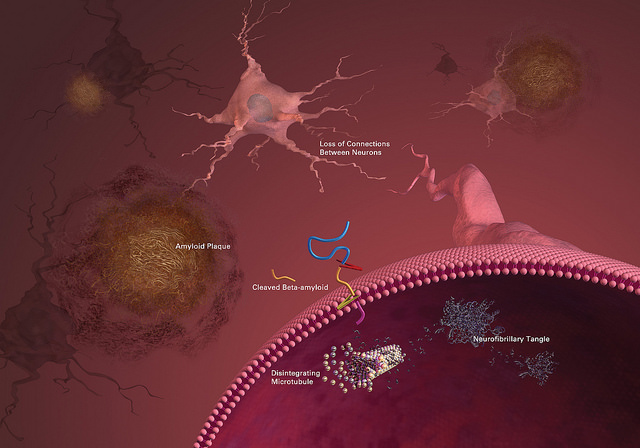Exciting new research from the Wake Forest School of Medicine shows that an insulin nasal spray may be effective in treating Alzheimer’s Disease, a type of dementia that causes loss of memory and cognitive degeneration, as seen in the bottom right image.
While previous studies have shown that insulin may be effective in treating people with Alzheimer’s or Mild Cognitive Impairment (MCI), this study by Dr. Suzanne Craft and colleagues was the first to use a synthetic form of insulin called insulin detemir, a longer-lasting form of insulin. Sixty adults diagnosed with MCI or Alzheimer’s were given one of three treatments for 21 days: 40 International Units (IU) of insulin detemir, 20 IU of insulin detemir, or 20 IU of a placebo (IU is a measure of the amount of insulin given, where about 29 IU is equal to 1 milligram of insulin). All three treatments were given to subjects as a nasal spray.
Image Source: Ian Waldie
Results of the study showed that while insulin detemir did not show any significant improvement for the subjects’ daily functioning, those that took 40 IU of insulin detemir did show significant improvements in working memory over those who took 20 IU of insulin detemir or 20 IU of placebo. Working memory includes what we call short-term memory, encompassing temporary storage and manipulation of basic visual and verbal information.
Another interesting result of the study was that people with the APOE-e4 gene who received 40 IU of insulin detemir showed significantly higher scores on memory tests than people with APOE-e4 who received a lower dosage of insulin detemir or the placebo. This finding is significant because APOE-e4 has been shown to be associated with a higher risk of developing Alzheimer’s, and people with APOE-e4 who develop Alzheimer’s have been particularly more difficult to treat than those without the gene.
While more research is needed to determine the long-term effectiveness and safety of an insulin detemir nasal spray for treating Alzheimer’s, these initial findings show that the treatment has great potential with minor side effects.
Feature Image Source: Characteristics of Alzheimer’s Disease by NIH Image Gallery










